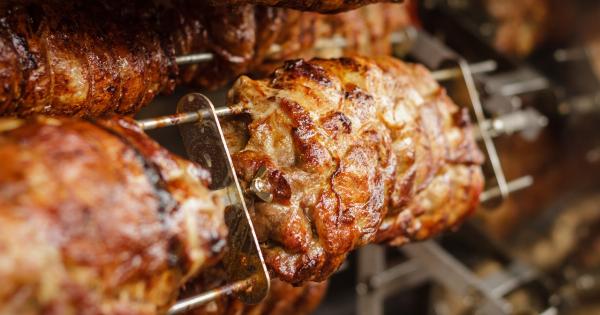Sleep deprivation is a common issue faced by many individuals in today’s fast-paced and demanding world. Busy schedules, excessive screen time, stress, or even medical conditions can contribute to lack of sleep.
Chronic sleep deprivation can have serious consequences on our overall health and well-being, including our eating habits. In fact, studies have shown a clear connection between sleep deprivation and increased appetite, cravings, and binge eating.
1. Increased Appetite
One of the primary causes of sleep-deprived binge eating is the disruption of hunger hormones. Lack of sleep affects the production and regulation of certain hormones that control appetite, such as ghrelin and leptin.
Ghrelin is responsible for stimulating hunger, while leptin signals fullness and helps regulate energy balance.
When we don’t get adequate sleep, the production of ghrelin increases, leading to an increased feeling of hunger. At the same time, the production of leptin decreases, making it difficult for our body to recognize when it has had enough food.
As a result, we may experience more intense cravings and a tendency to overeat or indulge in unhealthy foods.
2. Emotional Eating
Sleep deprivation can also lead to emotional eating. When we are sleep-deprived, our mood and emotional state can become negatively affected. We may experience higher levels of stress, anxiety, irritability, and depression.
These emotions can trigger a desire to seek comfort in food, leading to emotional eating.
Research suggests that sleep deprivation alters brain regions involved in the regulation of emotions and reward processing, making us more susceptible to using food as a way to cope with negative emotions.
This can result in a pattern of consuming calorie-dense comfort foods, often leading to overeating and an unhealthy relationship with food.
3. Stress
Sleep deprivation is known to increase stress levels. When we don’t get enough sleep, our body’s stress response system, which includes the release of stress hormones like cortisol, becomes dysregulated.
Elevated cortisol levels can stimulate appetite and lead to increased food intake, particularly sugary and fatty foods.
Furthermore, higher levels of stress increase the likelihood of emotional eating as mentioned before, compounding the issue of sleep-deprived binge eating.
The combination of sleep deprivation and heightened stress can create a vicious cycle of poor sleep, increased stress, and unhealthy eating habits.
4. Hormonal Imbalance
Chronic sleep deprivation disrupts the delicate balance of hormones in our body. In addition to ghrelin and leptin, other hormones involved in appetite regulation and metabolism, such as insulin, are affected by lack of sleep.
Insulin is responsible for regulating blood sugar levels and promoting the storage of glucose as energy in our cells. However, sleep deprivation can impair insulin sensitivity and lead to insulin resistance.
This can result in elevated blood sugar levels, increased cravings for sugary foods, and a higher risk of developing metabolic conditions such as diabetes.
5. Lack of Energy
When we are sleep-deprived, our body and mind naturally seek sources of energy to compensate for the lack of rest. Consuming food, especially ones high in calories, sugar, and fat, can provide an immediate energy boost, albeit temporary.
This desire for quick energy can lead to mindless snacking, overeating, or resorting to unhealthy food choices to keep us going throughout the day.
Unfortunately, these patterns of behavior can negatively impact our long-term physical health and contribute to weight gain and obesity.
6. Disrupted Circadian Rhythm
The circadian rhythm is our internal biological clock that regulates various physiological processes, including metabolism and appetite. It is influenced by external factors, particularly light exposure and regular sleep patterns.
Sleep deprivation can disrupt our circadian rhythm, leading to inconsistencies in hunger and fullness cues.
When our body’s internal clock is thrown off balance, we may experience irregular meal timings, late-night snacking, or even nocturnal eating disorder. These disruptions can contribute to an unhealthy eating pattern and excessive consumption of calories.
7. Lack of Self-Control
Sleep deprivation can impair our cognitive function and decision-making abilities.
Studies have shown that when we are sleep-deprived, the prefrontal cortex, which plays a crucial role in self-regulation and impulse control, does not function optimally.
With reduced self-control, we may find it challenging to resist food cravings or make healthy food choices.
The combination of increased appetite, emotional eating, stress, and hormonal imbalances can further diminish our ability to exercise restraint, leading to impulsive and excessive eating episodes, commonly known as binge eating.
8. Tips to Manage Sleep-Deprived Binge Eating
Understanding the underlying causes can help in managing sleep-deprived binge eating. Here are some tips that may be helpful:.
- Improve sleep hygiene: Establish a consistent sleep schedule, create a soothing sleep environment, limit exposure to electronic devices before bed, and practice relaxation techniques to enhance sleep.
- Manage stress: Incorporate stress management techniques into your daily routine, such as exercise, meditation, deep breathing exercises, or engaging in hobbies you enjoy.
- Seek support: If you struggle with emotional eating or binge eating, consider seeking help from a healthcare professional or therapist specialized in eating disorders.
- Eat a balanced diet: Focus on consuming nutrient-dense foods that provide sustained energy throughout the day. Include a variety of fruits, vegetables, lean proteins, whole grains, and healthy fats in your meals.
- Avoid skipping meals: Skipping meals can disrupt blood sugar levels and trigger excessive hunger, making you more prone to overeat or make unhealthy food choices.
- Practice mindful eating: Pay attention to your body’s hunger and fullness signals. Engage in mindful eating practices, such as eating slowly, savoring each bite, and being aware of the taste, texture, and satisfaction derived from food.
- Exercise regularly: Regular physical activity can help improve sleep quality, reduce stress levels, boost mood, and promote overall well-being.
9. Prioritize self-care:
Make self-care a priority by ensuring you have enough time for relaxation, hobbies, and activities that bring you joy. Engaging in activities that help you unwind can reduce stress levels and prevent emotional eating.
10. Consult a healthcare professional:
If you consistently struggle with sleep deprivation and binge eating despite implementing self-help strategies, it is advisable to seek guidance from a healthcare professional.
They can assess underlying medical conditions, provide personalized strategies, or refer you to specialists if necessary.























